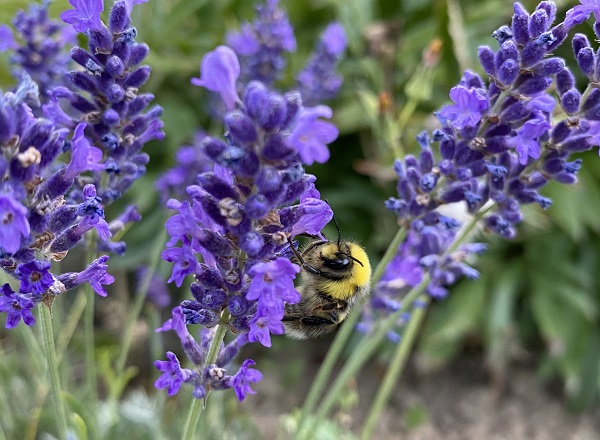 A bee enjoying summer blooms;
Credit: © Nathalie Grotz
A bee enjoying summer blooms;
Credit: © Nathalie Grotz
In the fifth in a series of articles about current conservation issues, experts at natur&ëmwelt, a leading nature conservation NGO in Luxembourg, spoke to Chronicle.lu about pollinators and their vital role in our ecosystem - a particularly relevant topic as the summer months approach.
Natur&ëmwelt volunteer Claire Schroeder helped collect the relevant information from the NGO for this article.
Chronicle.lu: First things first, what is a pollinator?
Natur&ëmwelt: Simply put, a pollinator is an insect (or other agent) that conveys pollen to a plant thereby allowing fertilisation. This process is vital for the balance of our ecosystem.
Chronicle.lu: Which pollinators are most commonly found in Luxembourg?
Natur&ëmwelt: The most common ones you will probably recognise around here are bees. There are lots of different types of bees, from the carpenter bee to the hairy-footed flower bee, the wool carder bee or even the ashy mining bee. While honeybees have arguably a trickier work-life balance (producing honey and beeswax at the same time as caring for a large family), it is in fact bumblebees and solitary bees which pollinate more plants per day than honeybees. Other insects are also involved in this precious work. Butterflies are avid pollinators, as are wasps, beetles, dragonflies and even some birds.
Chronicle.lu: Why are pollinators important?
Natur&ëmwelt: The decline of pollinators will also endanger the plants they pollinate and this is just the beginning of a domino-effect that is catastrophic for our whole eco- and agricultural system. So, before you swat your next insect victim at a picnic just remember- without them, you probably wouldn’t be having that picnic in the first place.
Chronicle.lu: Now that you mention it, there do seem to be fewer insects around than in years past…
Natur&ëmwelt: Correct - you might have noticed that you have to clean your windshield less often nowadays then you did in summers past. This is not just an impression. In the past 30 years, there has been a reduction of over 75% of the flying insect biomass. As bees are declining too, it is important to preserve them and avoid disturbing a hive if you find one.
Chronicle.lu: Why are pollinators struggling?
Natur&ëmwelt: Chemicals such as insecticides, herbicides, fungicides and miticides play a huge role in the decline of these insects. Whether it be on plants directly or by infiltrating the ground they live in, these insects are hugely sensitive to these chemicals. Beyond that, like for most fauna and flora, climate change is proving challenging for pollinators.
Chronicle.lu: What can individuals do to help?
Natur&ëmwelt: It is important to include local, wild and ancient varieties in your garden so that pollinators have a variety of nectar and pollen sources, and of course, avoid chemicals. Insect hotels are all the rage at the moment and for good reason - pollinators are usually more than happy to use them. These habitats can be as fancy as a store-bought house or as simple as a pile of dead branches. You can also leave a bowl of water out for them to drink from, just add a few twigs in there to allow them to climb back out if needed.
Chronicle.lu: And for people who do not have a garden, is there anything they can do?
Natur&ëmwelt: Yes! A good way to make an impact is to buy organic where possible and support your local farmers who opt for chemical-free practices. You can also show your support to your nearest beekeepers. Beekeeping encourages growth in bee population and thus pollination. Otherwise, we encourage you to sow flowers in whichever public spaces possible or help with practical conservation by maintaining meadows and participating in “chantiers nature” offered by natur&ëmwelt every year from October to March.








